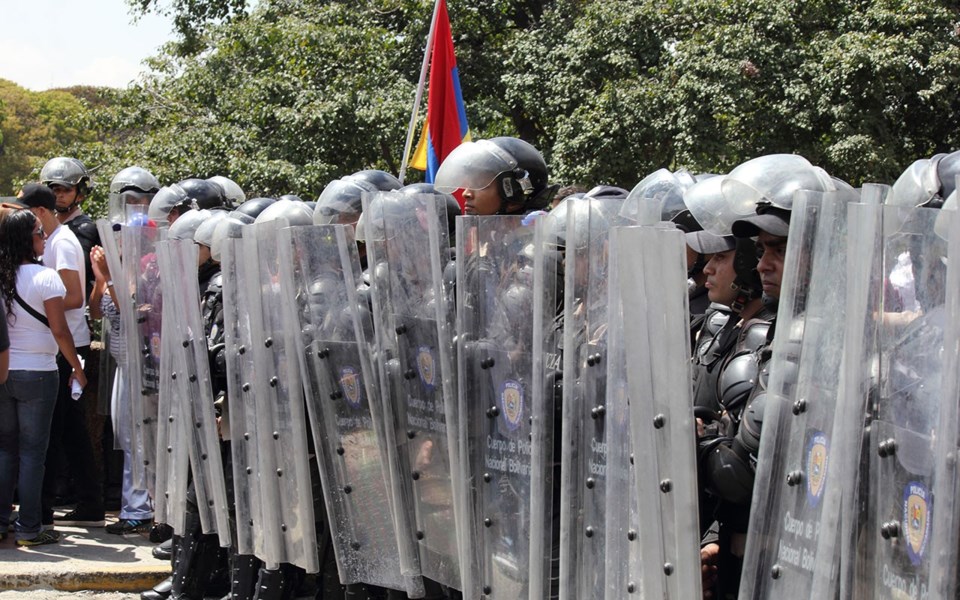There are two stories about the assault on Fuerte Paramacay military barracks in Carabobo state on Sunday, Aug. 6. The Venezuelan government says that half the 20 attackers were killed or captured, and the rest are being hunted down. Sgt. Giomar Flores, who defected from the Venezuelan navy in June and now lives in Colombia, told The Guardian that the attack had been "a complete success."
"We took four battalions and one put up resistance," he said, claiming to be in direct contact with the leader of the attack, Capt. Juan Caguaripano. The rebels took "a large amount of weapons," mostly assault rifles, and got away with no casualties.
Whichever story you believe, witnesses agree that large numbers of civilians living near the base in Valencia, the capital of Carabobo, spilled out onto the streets in support of the rebels. Civil war in Venezuela is not yet a reality, but there is ample dry tinder lying around just waiting for a match.
The attack came just one week after the election of a "constituent assembly" by the supporters of President Nicolas Maduro's beleaguered government. It's hardly surprising that the opposition boycotted the vote, because the purpose of the new assembly is to rewrite the constitution and save Maduro from defeat at the next election.
The constituent assembly, which Maduro created by decree, consists exclusively of 545 Maduro supporters. There is no time limit on how long it will sit, nor any restrictions on what it can do. It can, for example, postpone the presidential elections that are due next year indefinitely. This matters a lot, since Maduro would certainly lose in a fair vote — recent estimates put his popular support at around 20 per cent.
More immediately, it can dissolve the legitimate National Assembly, in which the opposition parties won a two-thirds majority in the December, 2015 election. And it has already fired Prosecutor-General Luisa Ortega, a member of the Socialist Party and former ally of Maduro's who broke with him over his increasingly arbitrary behaviour.
The most threatening thing Ortega did was to open an investigation last week into the vote on July 30 that created the constituent assembly. Since only Maduro's supporters voted, that would seem irrelevant — but in mid-July the opposition had held an informal referendum in which seven million people voted against the constituent assembly.
Maduro therefore felt the need to claim that more than eight million Venezuelans had voted for the new assembly. Even that would not really be a very impressive turnout in a country of 30 million people — but then the company that supplied the voting machines, SmartMatic, said that the result had been deliberately inflated. At least a million extra votes had been added.
Antonio Mugica, the chief executive of SmartMatic, said that all previous elections in Venezuela using their machines had been conducted fairly. "It is, therefore, with the deepest regret that we have to report that the turnout figures on July 30 for the Constituent Assembly in Venezuela were tampered with," he said.
"This is a dictatorship," Luisa Ortega said on Aug 6, and she is right. Maduro has concluded that he and his Socialist Party can only stay in power by suppressing all opposition, and he is probably right. The regime he inherited in 2013 on the death of its founder, Hugo Chavez, was once genuinely popular and won free elections, but four years of falling oil prices, economic mismanagement and growing corruption have put an end to that.
The street protests against Maduro have lasted four months now, and at least 120 people have been killed. Inflation is 1,600 per cent, food and medicines are scarce, and the murder rate is among the highest in the world. The generals are richly rewarded for serving the regime, but rank-and-file soldiers earn a couple of dozen dollars a month.
Venezuela is a tinderbox. There are hundreds of thousands of devoted supporters of the "Chavista" regime, and the government has distributed weapons to them. If the report that most soldiers did not resist the attack on the Valencia barracks is true, the army may be about to split. The violence in the streets is mutating, with more police casualties as well as the daily toll of demonstrators.
There is no worse disaster for a country than a civil war, but Venezuela is drifting towards one.
Gwynne Dyer is an independent journalist whose articles are published in 45 countries.




